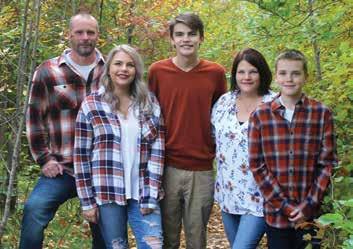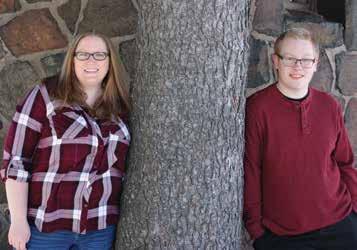
2 minute read
Finding comfort in the uncomfortable
Mothers face fears for autistic children
The free eight-month program is aimed at helping disabled individuals achieve greater independence, productivity, selfdetermination, integration and inclusion. Since 1987, this program has taught more than 1,000 people how to become leaders and develop positive partnerships with elected officials and policymakers. During the program, one weekend per month, participants drive to the Twin Cities for an intense weekend of training.
“I want to be able to teach Tanner how to do it. Right now, he is 15, but I am his voice and I want to give him the tools
How autism affects us all
April is World Autism Month, and to honor the occasion, Seguin and Godden recommend exploring Autism Speaks (autismspeaks.org) to learn how this disability impacts your community members.
According to the Centers for Disease Control, autism affects an estimated 1 in 59 children in the U.S., and this resource promotes solutions for the needs of people with autism and their families.
to do it himself,” said Katie Godden, a Duluth resident whose son, Tanner, was diagnosed with autism in 2011 when he was 7 years old. She graduated from the Partners in Policymaking this past year.


“When I started I thought, ‘I’ll just go and get to talk with other people and learn how to advocate for my kid, maybe meet a friend or two.’ But it’s not like that,” Godden said with a laugh. “It’s hardcore, intense, out-of-your-comfort-zone, make-you-nervous-on-the-drive-down-to-the-Cities weekend full of tears. You hear other people’s stories. You get to share your own. They teach you how to advocate, what resources are available and how to get in touch with representatives.”
While uncomfortable and challenging, Seguin said this type of training is essential.
“You are doing it for people who may not have the voice to be able to do it. It may be really scary for me, but I have the ability to do it,” she said.
Fighting for equal rights
While they’ve known each other as acquaintances for years, Seguin and Godden became fast friends once they realized they both had sons with autism. Seguin said Jaxson’s diagnosis rocked the family and dealt multiple challenges to her, her husband Jason, and Jaxson’s siblings, Kaela Carlson, 25, and Eli Seguin, 14.
Today, Jaxson is a bright teenager who is quiet, political, artistic and religious. He is on his high school’s robotics team and serves as a manager of the school’s baseball team. And 15-year-old Tanner Godden is creative, outspoken, outdoorsy and loves to make people laugh. Thanks to loving support and valuable resources, the two boys are thriving in their school environment. But it wasn’t always that way.
“[Jaxson] still doesn’t talk about school, but we wanted a notebook back-and-forth, every day, with the paraprofessionals, who are such a big part of our children’s lives,” Seguin said. “We’ve had some very bad things happen [when a paraprofessional wasn’t present]. Our son was suspended, severely bullied.”
Advice for parents with autistic children
“We have dealt with quite a bit, and it’s very hurtful,” Seguin said when reflecting on past experiences taking Jaxson out in public. “You never want to shame a parent because of how a child is acting when it’s not bad behavior — it’s just autism.”
The pair recommends that autistic children carry business cards to explain behaviors to concerned community members when out in public.
“We had a very bad experience at Super One one day and still, when I’m at Super One, I feel that sadness
Continued on page 25










